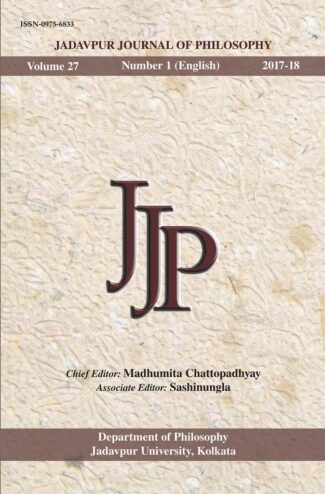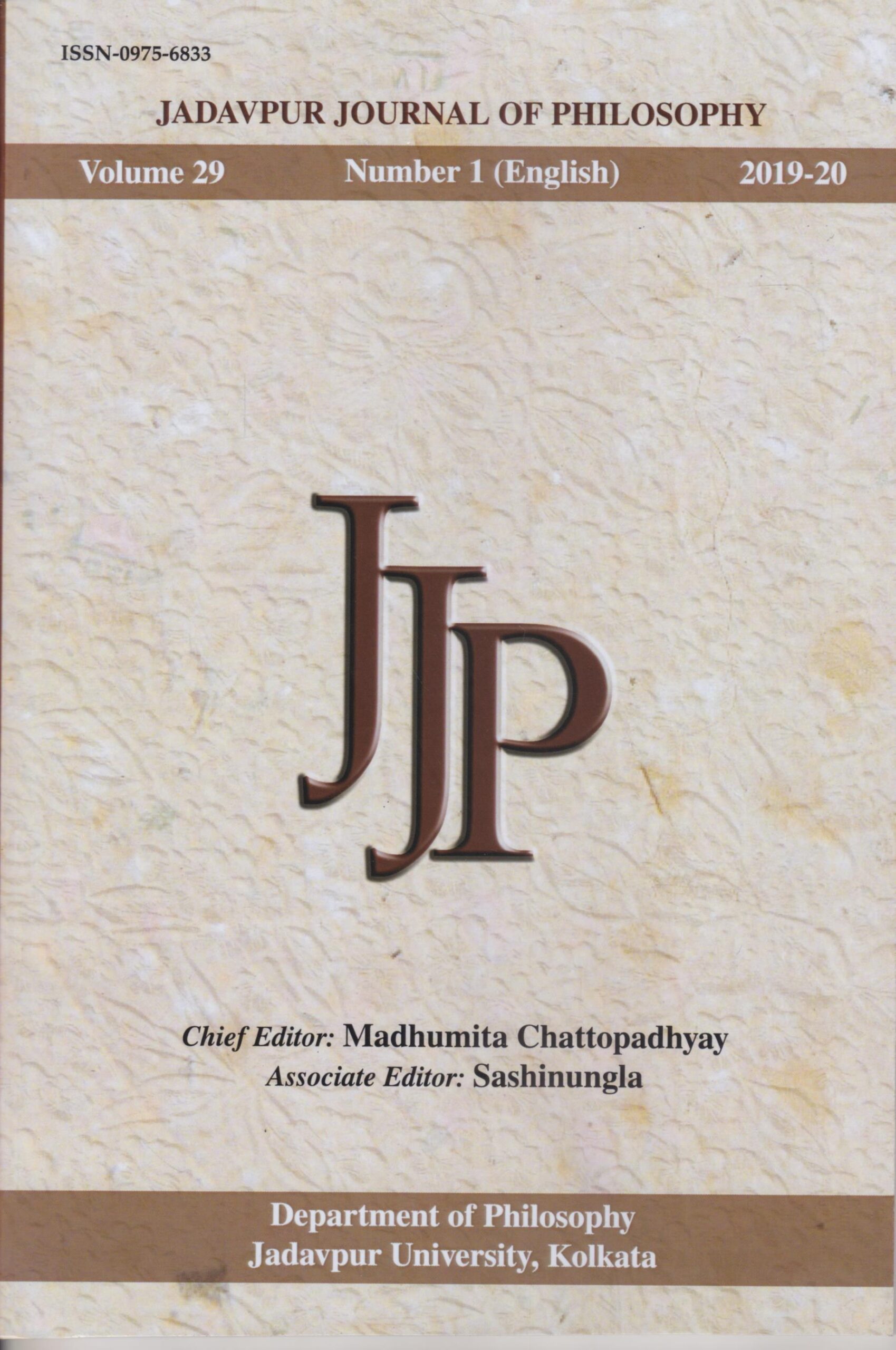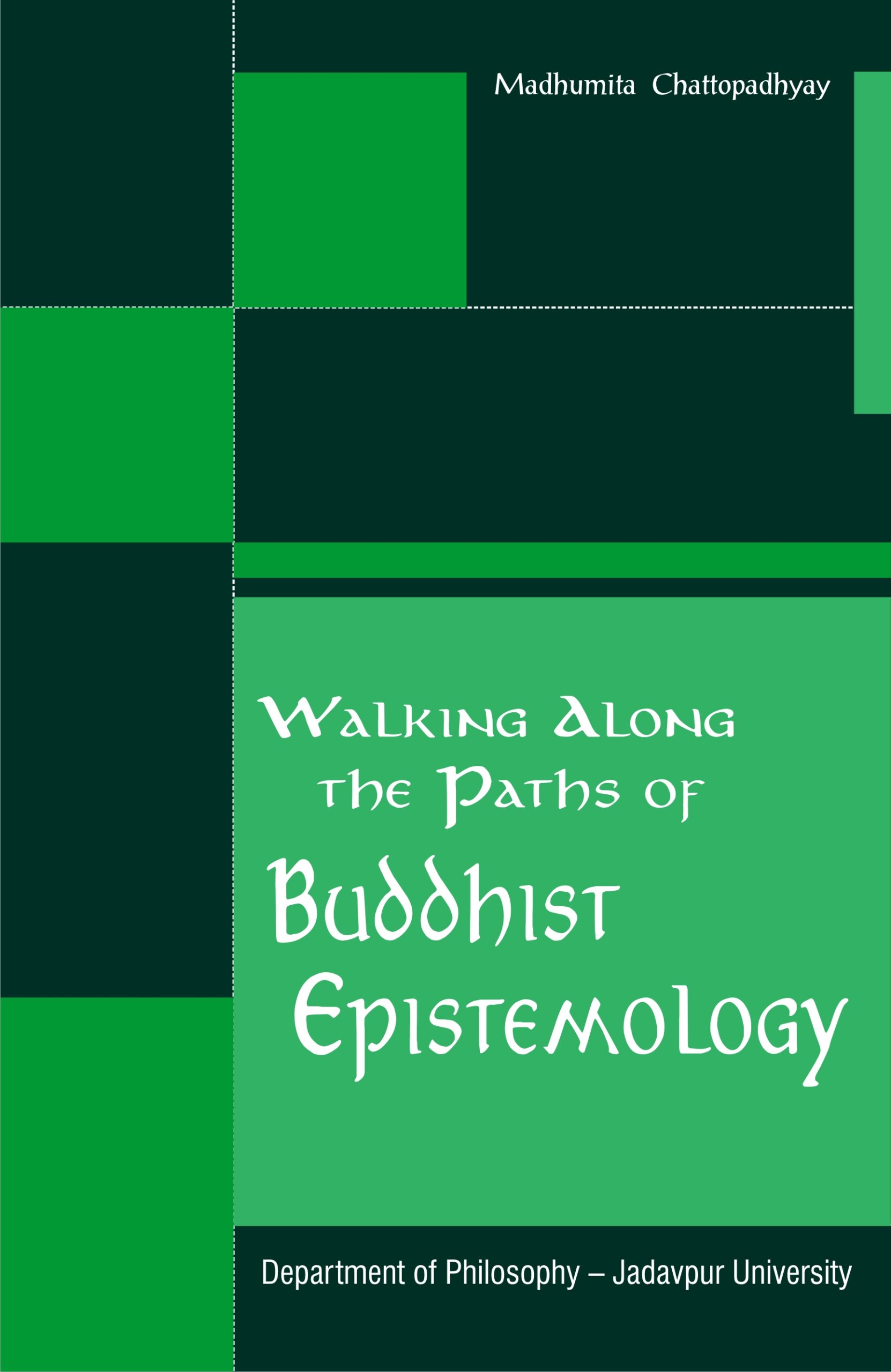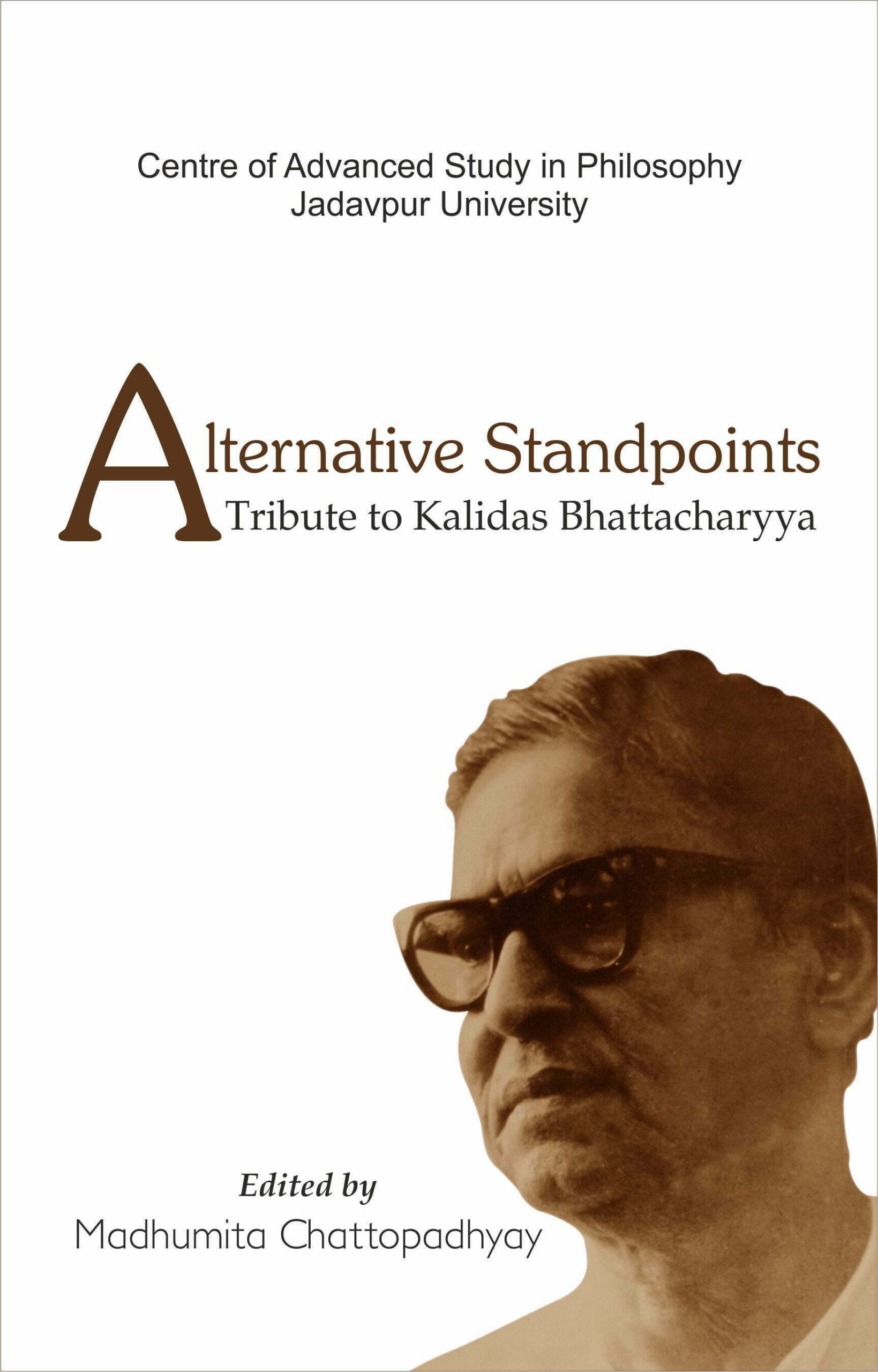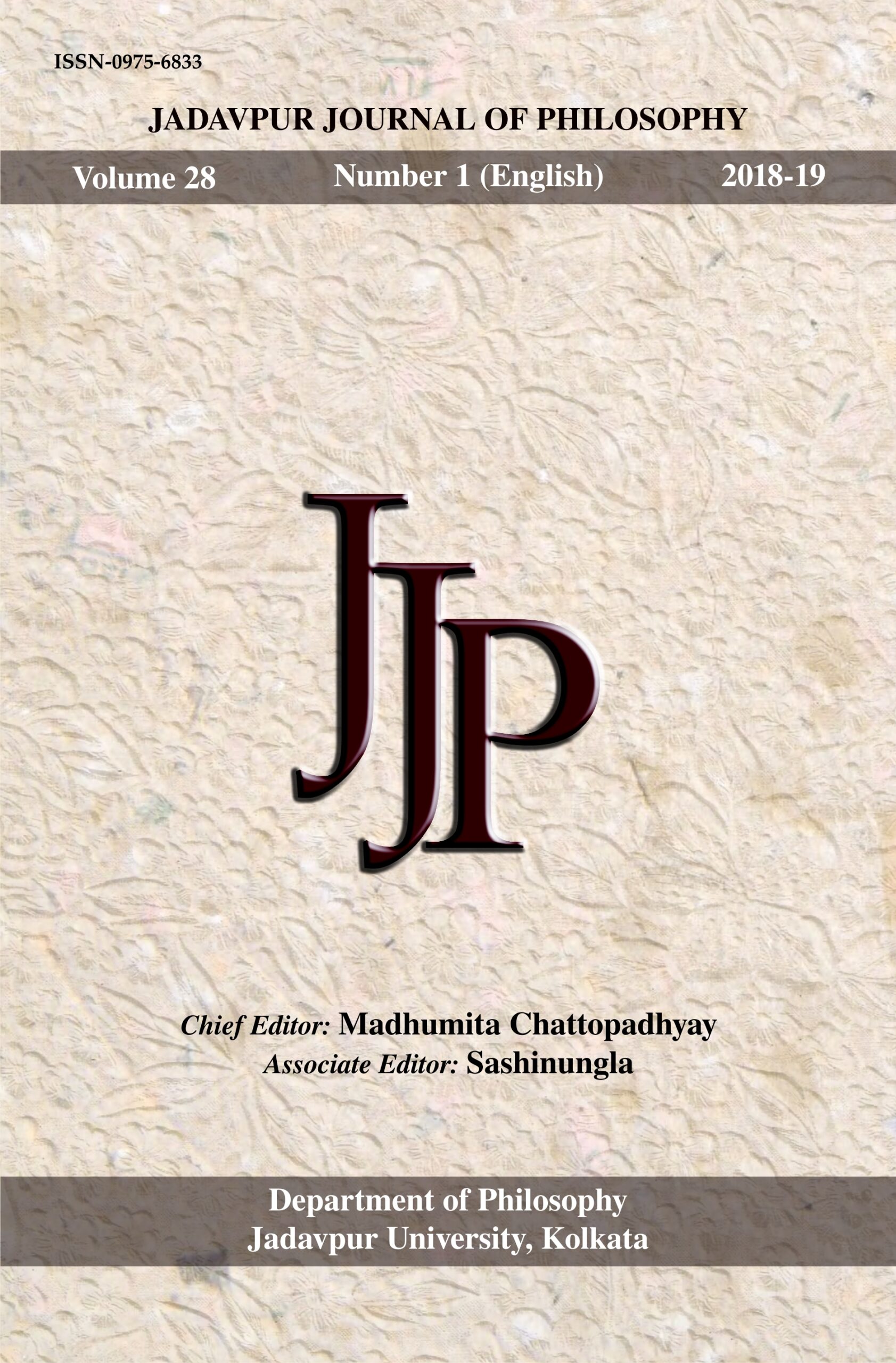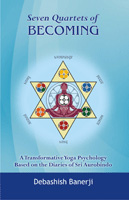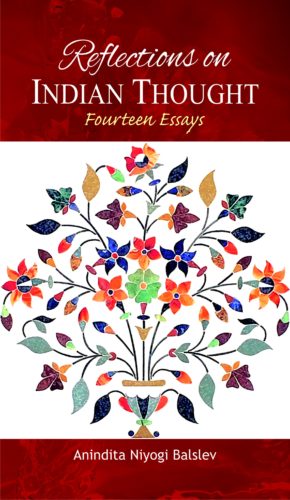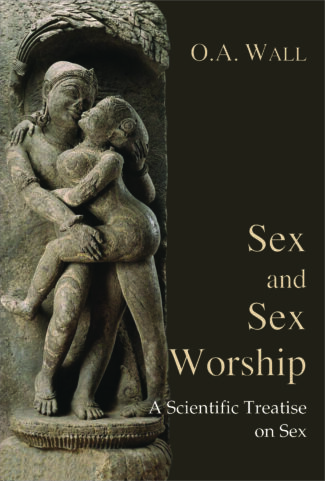

Jadavpur Journal No....
Jadavpur Journal No. 27
by: Madhumita Chattopadhyay , SashinunglaJadavpur Journal of Philosophy is a refereed, bi-issue journal, in English (No. 1) and Bengali (No. 2) published annually by the Department of Philosophy, Jadavpur University, Kolkata, India. The journal volume in Bengali is titled Darsan Biksa. The journal is devoted to the publication of original scholarly papers in any branch of philosophy. Its objective is to encourage contributions from scholars, dealing with specific philosophical problems connected with their respective fields of specialization.
₹300.00 Original price was: ₹300.00.₹270.00Current price is: ₹270.00.
ISBN: 9788100000786
Year Of Publication: 2018
Edition: 1st
Pages : 143p.
Language : English
Binding : Paperback
Publisher: Jadavpur University
Size: 23
Weight: 250
Jadavpur Journal of Philosophy is a refereed, bi-issue journal, in English (No. 1) and Bengali (No. 2) published annually by the Department of Philosophy, Jadavpur University, Kolkata, India. The journal volume in Bengali is titled Darsan Biksa. The journal is devoted to the publication of original scholarly papers in any branch of philosophy. Its objective is to encourage contributions from scholars, dealing with specific philosophical problems connected with their respective fields of specialization.
- Sale!Seven Quartets of Becoming by: Debashish Banerji
₹1,200.00Original price was: ₹1,200.00.₹1,080.00Current price is: ₹1,080.00.Groomed in a modern academic tradition and post-Enlightenment ideals of creative freedom and social critique, Sri Aurobindo (1872-1950) turned his attention to yoga and the limits of consciousness in its ability to relate to and transform nature. In the process, he documented scrupulously his experiments and experiences based on a synergistic existential framework of practice.
Debashish Banerji correlates the approach to yoga Sri Aurobindo took in his diaries with his later writings, to derive a description of human subjectivity and its powers. Banerji constellates Sri Aurobindo’s approach with transpersonal psychology and contemporary lineages of phenomenology and ontology, to develop a transformative yoga psychology redefining the boundaries and possibilities of the human and opening up lines of self-practice towards a wholeness of being and becoming.
Both scholar and Yogi, Aurobindo (1872-1950) carefully documented the unfolding of spiritual consciousness starting shortly after his deep revelatory experiences while in prison in 1908. His observations were recently published in a two volume set, The Record of Yoga. Debashish Banerji has analyzed this work and offers a detailed, clear, systematic and inspirational interpretation of how the Yoga of Sri Aurobindo may be understood and practiced.
Þ From the `Foreword’ of
Prof. Christopher Key Chapple
Doshi Professor of Indic and Comparative Theology Loyola Marymount University, Los Angeles, (USA) - Sale!Reflections on Indian Thought by:
₹850.00Original price was: ₹850.00.₹765.00Current price is: ₹765.00.This anthology, consisting of fourteen essays, deals with a variety of themes that are of central importance for an authentic appreciation of the philosophical core of the Indian culture. The readers will find here illuminating discussions on various issues that bear witness to the critical thinking and deep reflection on the part of the author that have enabled her to carefully expose the subtle internal divergences that nourish the Indian conceptual world.
Based on arduous and painstaking research, these essays focus on a range of topics. There are several essays on multiple aspects of the large themes of time and consciousness, penetrating analysis showing how in the ancient discourse ideas of klesha (affliction), abhyasa (practice) and karuna (compassion) as well as on women and values are dealt with. There are also deliberations on the themes of religious diversity and the need for an encounter of world religions along with the attempt to explore India’s self-image. All these have contemporary relevance, as these essays clearly bring out the distinctive character of a living culture. - Sale!An Introduction to Jain Philosophy by: Parveen Jain
₹1,600.00Original price was: ₹1,600.00.₹1,440.00Current price is: ₹1,440.00.It is well-known that the Jain tradition has been extremely influential in the development of Indian thought and culture. The Jain tradition teaches that there is an interdependence of perception, knowledge, and conduct unified by an axiomatic principle of non-violence in thought, speech, and action. In this way, non-violence defines the core of the Jain tradition, which has had a profound effect on other dharmic traditions originating in India. Jain Dharma is so significant that in some ways it may be incomplete to attempt to understand other Indian traditions (such as Buddhism or Hinduism) without knowing the basics of the Jain tradition, since these other traditions developed in an ongoing dialogue with the insights and wisdom of Jain respondents and visionaries.
This book enables the reader to enjoy a comprehensive journey into the intricate world of Jain thought and culture in a way that is philosophical in its compelling rationality, deeply spiritual in its revelations, yet accessible in its language. The organization of this book allows the reader to engage in an overview of the central teachings of the Jain tradition, but also to ascertain the profundity of its depths. It can be read with equal efficacy in succession from beginning to end, or pursued by individual topics of interest to the reader. Either strategy will have the same effect: a systematic understanding of what the timeless teachings of Jain thinkers have to say about the universal issues of the human condition – and how we might understand our harmonious relationship with other living entities as a powerful and effective spiritual journey. - Sale!An Introduction to Vedanta by: R. Subramony
₹550.00Original price was: ₹550.00.₹495.00Current price is: ₹495.00.Vedanta holds an unparalleled and unique place among the six systems of Indian philosophy. Though the Vedas are the fountainhead of Indian philosophical systems, Vedanta incorporates the philosophical thoughts resplendent in the Upanishads, the Brahmasutras, the Bhagavatgita, and in the commentaries on all these texts.
An Introduction to Vedanta introduces the Vedanta philosophy in brief and talks about its cardinal issues like self-control and the meaning of worship, maya and its gunas, upadhi, the theory of cycle, subtle bodies, the role of meditation, samadhi and its four major obstacles, Brahman realization and the state of a jivanmukta and his relation with Brahman and the world. - Sale!Sex and Sex Worship by: O. A. Wall
₹1,990.00Original price was: ₹1,990.00.₹1,980.00Current price is: ₹1,980.00.Mankind, when it gave expression to its first dawning of religious thoughts, wove a fabric of myths and theories about religion, the warp of which ran through from earliest historical times to our own days as threads of the warp of philosophies and theories about sex, male, female, love, passion, lust, desire, procreation, offspring, etc. The succeeding ages and civilizations wove into its warp the woof of the individual religions, myths and fables of gods and goddesses, so that the whole fabric of beliefs became refined as mankind itself advanced.
Sex and Sex Worship is the result of a long-time, arduous study of the concept of sex and the worship of phallus in various civilizations and in the development of different religions, modern and old, over a period of many millennia. The book makes one grasp a lot of topics associated with sex and sex symbols such as nature of sex and reproduction, status of women, cosmo-gonies, sex in man and animal, sexual relationship of gods and goddesses, virgin worship, phallic festivals, among many, while making it clear that the worship of generative organs was rather a use of representations of phallus and yoni as symbols for certain religious ideas which were embodied in nature worship.
It also vividly talks about the concept of sex and sex organs in art and ethics, sculpture, art anatomy, etc. The contents in toto lead one to the myriad aspects and concerns associated with sex and phallic worship. It is a must read for a scholar and a common man alike.


